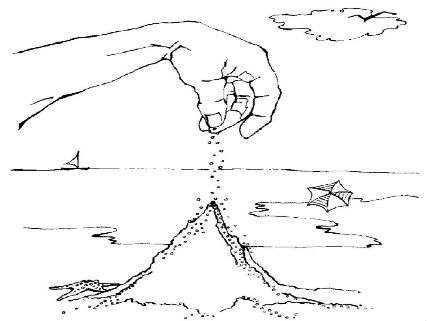Is Complexity Science Ready for Prime Time?
Ronald Bailey's Wall Street Journal review of A Crude Look at the Whole

Carnegie Mellon University economist John Miller's new book, A Crude Look at the Whole: The Science of Complex Systems in Business, Life, and Society, promises more than it delivers. The book's title is taken from the observation by Nobel physics laureate Murray Gell-Mann that it is necessary to step back from the particularities of individual academic disciplines in order to get a sense of how technology, economics, demography and politics interact to create the challenges that confront humanity in the 21st century. Miller claims, but ultimately can't establish, that there deep links between the behaviors of disparate phenomena such as bacteria, bee hives, brains, and stock markets. Still the book is studded with some interesting insights. Here are few excerpts from the review:
"We inhabit a world where even the simplest parts can interact in complex ways, and in so doing create an emerging whole that exhibits behavior seemingly disconnected from its humble origins," observes Mr. Miller. Examples of this process include biological evolution, markets, the Internet and even human consciousness itself.
For example, consider:
In 2010, a fruit vendor, humiliated by a policewoman when he couldn't pay her a bribe, set himself on fire in protest in the remote Tunisian town of Sidi Bouzid. Discontent resulting from strongman rule, pervasive corruption and a lack of opportunity for Arab youth had been building throughout the region for decades. Yet no experts would have predicted that Mohamed Bouazizi's fiery death would trigger the Arab Spring uprisings, the consequences of which are still unfolding.
"Knowing the parts is not equivalent to knowing the whole," could be the slogan for economist John H. Miller's book on the science of complex systems. In "A Crude Look at the Whole," Mr. Miller, citing the events that led up to the Arab Spring revolutions, argues that societies are complex systems in which endogenous tensions accumulate so that, finally, one relatively small event like Bouazizi's self-immolation provokes dramatic social upheaval. …

Miller eventually gets to the notion of self-organized criticality. Like other practitioners of complexity science, he illustrates the concept using a pile of sand to which grains of sand are constantly being added. Many land and simply find a place in the pile; some grains land and cause small local avalanches, which soon come to rest; and eventually a grain lands that causes a huge avalanche that changes the shape of the whole pile. Miller analogizes societies to sand piles in which endogenous tensions accumulate so that finally one relatively small event provokes social upheaval. "At the slightest touch, our world can go from stones to sand," declares Miller. Knowing this, however, is not much help to policymakers or citizens.
As an example of how unintended deleterious behaviors can emerge from interconnected complex systems, Mr. Miller dissects the May 6, 2010, "flash crash" in U.S. securities markets. A retrospective analysis concluded that it occurred as a result of a design flaw in a trading algorithm used by a small firm located in Shawnee Mission, Kan. The trades orchestrated by the algorithm inadvertently created a positive feedback loop that was amplified by high-frequency computer trading in the tightly connected derivatives markets. All market participants understood how each piece of the trading system was designed to work but did not foresee how their interactions could produce the flash crash.
So what lessons do we learn from this case? Mr. Miller suggests that "we might not ever be able to fully control such systems, but we may be able to mitigate their downsides through the clever introduction of metaphorical firebreaks such as the circuit breakers that are used in financial markets." Unfortunately, readers looking for insights more concrete than "metaphorical firebreaks" will be disappointed.
Miller asserts that "effective decentralized decision making may be one of the best new old ideas to emerge from complex systems." This observation acknowledges the plain fact that we human beings are terrible at foresight. Humanity advances economically, technologically, politically and yes, morally, only through an iterated process of trial and error. There are no trials without errors. Miller astutely quotes James Joyce who once noted that "mistakes … are the portals of discovery."
Ultimately Miller takes readers on a rudimentary tour of what is still a young science. Complexity science as it now stands can help to diagnose problems but offers few cures.
Go here to read my whole review.


Show Comments (11)